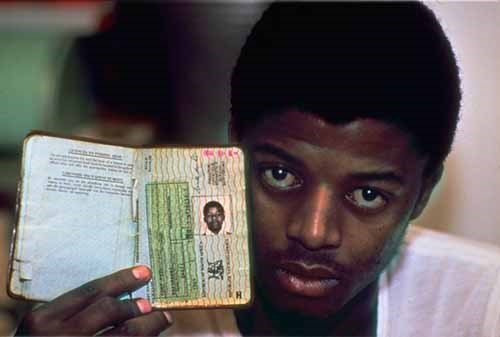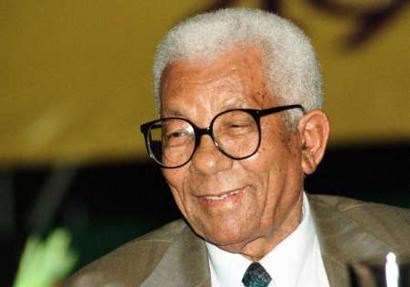 |
| Apartheid Pass Book (http://shanewilson.multiply.com/photos/photo/22/13 (shanewilson.multiply.com)) |
Apartheid Intro
Apartheid, meaning separateness, was a series of laws and restrictions set on black colored people. Many of the laws were set up were to restrict where black people could work, where they could live, whether or not they could own land, and preventing them from any sort of governmental power. Segregation, where one race is forced to obey certain restriction set upon them to harm them, was a major part in Apartheid, humiliating them in ways such as the dreaded passbook. An example of segregation is jobs.
During Apartheid, blacks were only allowed to do physical labor as a job such as working at potato farms or as a gardener for a white family. One of the largest and most hated laws of the apartheid was the passbook. A passbook was a small black book that all black South Africans were forced to carry at all times of their lives. They received their first passbook when they turned 16 years of age and were required to keep it updated in where they worked, if they were married etc.. If this book was out or order by the governments standards, which were quite often changing and modifying rules, that the punishment was quite harsh. Types of this punishment included severe fines, arrest which could involve being sent to a farm to produce free labor, or even being deported back to their tribal lands. In the book Kaffir Boy, Johannes's father was arrested for having his passbook out of order after being laid off from his job even though it was supposed to be a temporary lay off and he was constantly working to find a new job .
 |
| Walter Sisulu (http://www.commondreams.org/headlines03/images/0506-04.jpg (www.commondreams.org)) |
Biography
On May 18, 1912, a man who would greatly effect Apartheid and the
ANC was born. Walter Ulyate Max Sisulu was born in Qutubeni, a small
village inside the city of Transkei. Walter worked in Johannesburg for
several years of his life, moving between his birth place of Qutubeni,
London and Johannesburg for working purposes up until 1940. In 1940, at
his current job at a bakery in Johannesburg, he was fired for striking
for better wages for himself and his fellow co-workers. In the following
year, he tried working at numerous other locations but was either fired
or quit due to one disagreement or another between the employer. In the
same year as being fired from the bakery, he had joined the ANC, or the
African National Congress.
In 1941, he met a woman by the name of Albertina Thethiwe, a young nursing student who was also from Transkei. They soon fell in love and by 1944, had gotten married. They had a total of five children born between 1948 and 1958: Max (born 1945), Lungi (born 1948), Zwelakhe (born 1950), Lindiwe (born 1954) and Nonkululeko (born 1958). Walter had exposed Albertina to politics, which she was relatively sheltered from before.
The ANC branched off later in 1944 in forming a youth wing in the ANC. This proposal was brought up by Leslie Gama at a meeting in Bloemfontein that Walter was attending as delegate of the ANC Orlando branch. Walter along with William Nkomo and Lionel Majombozi were given the duty to mobilize and promote this newly formed party. Over the following years, Sisulu rose rapidly though the ranks of the ANC and the youth group, but many members, including Walter and Albertina, were arrested for defying apartheid laws and plotting against them and then was barred for several months from the ANC. He still communicated though through secret meetings and radio communications in attempts to defy apartheid and help the ANC. When the ANC was officially banned in 1961, he was placed under house arrest, thus making it more difficult to communicate, although he still prevailed. In mid 1964, Sisulu was arrested and taken to Robben Island, leaving Albertina to fend for herself and her five children, along with her sister's two children which she had been taking care of. Even while in prison, Walter told the fellow prisoners about the ANC, it's history and its goals, and managed to gain power for the organization. On the outside of the prison, his children were also fighting for the ANC and helping in any way they could.
The ANC was officially unbanned in 1990 after the release of the political prisoners was greeted by the ANC proudly waving their banners and drapes, less then three months afterwards. Walter was later asked to lead the ANC and in 1991, was elected deputy president. The year 1994 was a proud moment for Sisulu, seeing the first free and diplomatic elections, celebrating his 50th wedding anniversary, and, although with much arguing, retiring from politics. He later died on May 3, 2003. In the end, Walter Ulyate Max Sisulu was a proud and important member of the ANC, a dedicated anti-Apartheid fighter and a heavily influential member of South Africa.
Beliefs
Walter Sisulu was a strong anti-aparthied figther. His father had been a white man who was visiting to supervise a black road gang and his mother was a local Xhosa woman. He was raised by his mother and his uncle, his father abandoning him.
One of the most influential things in Walter Sisulu's life was his lighter skin and mixed heritage. He felt distanced from his peers and rejected the differential attitude his family showed towards South Africa's white administration. Sisulu attended the local Anglican Missionary Institute in his early life, but at the age of 15, he dropped out after 4th grade in 1927 to support his family by working at a Johannesburg dairy. He returned to the Transkei later that year to attend the Xhosa initiation ceremony and officially be recognized as an adult.
In 1940, Walter Sisulu joined the African National Congress in which he allied with those pressing for black African nationalism and actively opposed black involvement in World War II. Sisulu patrolled his township's streets with a knife, and he gained a reputation as a street vigilante. He also obtained his first jail sentence for punching a train conductor when he took away a black man's rail pass.
Sisulu was arrested in the 1950's for being part of the 1952 Deiance campaing, along with 19 others that had been accused, under the Suppression of Communsim Act and sentenced to nine months of hard labor. The political power of the Youth League within the ANC had increased to the stage that they could push for their candidate for president, Chief Albert Luthuli, to be elected. In December 1952 Sisulu was also re-elected as secretary-general in the ANC. Even after his release from prison in 1991, he was still an apartheid fighter and continued to work to support the youth to continue the work that had been created so far.
Fight against Apartheid
Walter Sisulu was one of the key players in the fight against apartheid in South Africa. Because Walter Sisulu was half black and half white, he could have opted to the government for a higher status but instead chose to view himself as black and fight against apartheid. He was maintaining the fight against apartheid well before he joined the African National Congress (ANC) like in 1940 where he would often organize his black co-workers to demand fairer treatment and equal rights at the various jobs he worked; unfortunately for him he would often be fired from them soon after.. In 1941, Nelson Mandela came to Johannesburg and was told to seek out Walter Sisulu and for the next few decades came to view him as a mentor.
On December of 1956, Walter Sisulu and other ANC leaders were arrested and tried for the Suppression of Communism Act; this went on for four years until they were eventually acquitted. However on March 1960, police opened fire on 20,000 black South Africans who were protesting for the release of Nelson, and killed 69 of them. This became known as the Sharpeville Massacre. The ANC was then officially outlawed by the South African government. In response the secret militant group of the ANC, Umkhonto We Sizwe (Spear of the Nation), was created by the ANC leaders to carry out acts of sabotage; Walter Sisulu served as its political adviser. After a while of being under constant watch by the authorities Walter Sisulu decided that he could operate better by going underground. For four months Walter Sisulu vanished from the normal day to day life but he was found along with the other leaders of the ANC at their secret headquarters at a farmhouse located just outside of Johannesburg. Walter Sisulu was then sentenced to a lifetime imprisonment along with the other leaders of the ANC, however fortunately for him he only ended up serving 25 years after equal rights started to come into play and all political prisoners were released.
MLA Citations
"Walter Max Ulyate Sisulu." http://africanhistory.about.com/library/biographies/blbio-WalterSisulu.htm. about.com, n.d. Web. 25 Feb. 2012.
"Walter
Sisulu Biography - Grew Up in Tribal Area, Worked to Reorganize ANC,
Fought Dreaded "Pass Laws" Read more: Walter Sisulu Biography - Grew Up
in Tribal Area, Worked to Reorganize ANC, Fought Dreaded "Pass Laws" ." http://biography.jrank.org/pages/2373/Sisulu-Walter.html. Net Industries, n.d. Web. 25 Feb. 2012.
"Walter Sisulu." http://www.racematters.org/waltersisulu.htm. www.racematters.org, n.d. Web. 25 Feb. 2012.
"Walter Ulyate Sisulu." http://www.sahistory.org.za/people/walter-ulyate-sisulu. South African History Online , n.d. Web. 15 Feb. 2012.
Page created on 3/8/2012 12:00:00 AM
Last edited 3/8/2012 12:00:00 AM
